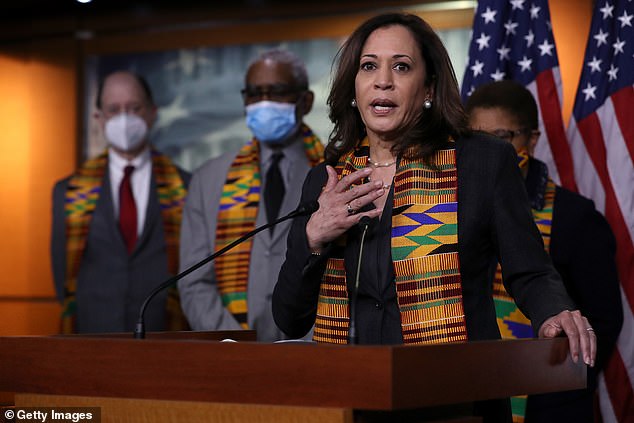Vice President Kamala Harris wrapped up her latest political reset Thursday night at the Democratic National Convention, channeling a sense of freedom and joy to fuel her campaign while shedding her most radical policy proposals.
With enthusiastic support from every living Democratic president and celebrities like Oprah, Democrats cheered wildly as she launched her new campaign.
“We are charting a new path to the future,” she told the cheering crowd. “Toward a future with a strong and growing middle class.”
The substance-free campaign is very different from the one Harris ran for president in 2020, when she embraced a far-left political agenda in an effort to appeal to the party’s most radical voters.
Harris, already a senator from California, moved further to the left on issues she previously opposed.
Harris supported marijuana use and co-sponsored a bill that would legalize it at the federal level, although she spent her life prosecuting marijuana users.
Harris supported bills that would offer Americans free college education, free health care, cancel student debt and offer monthly payments to couples making less than $100,000 a year. Harris also sponsored a bill to eliminate cash bail and voiced support for Rep. Alexandria Ocasio-Cortez’s $93 trillion Green New Deal.
Sen. Kamala Harris (D-Calif.) joins other House and Senate Democrats in introducing new legislation to end excessive use of force by police.

California Attorney General Kamala Harris speaks to California Democrats in 2015
As her presidential campaign continued, Harris moved even further to the left, supporting the idea of banning fracking to extract oil from the ground and the idea of reducing red meat consumption to reduce methane gas from cow farts.
Harris also supported banning plastic straws and decriminalizing prostitution.
She floated the idea of expanding executive power to allow the Justice Department to block state abortion laws and to use executive action to mandate a mandatory buyback program for some semi-automatic rifles and restrict gun sales.
Harris also supported the idea of defunding police departments, eliminating private prisons and mandatory minimum sentences and cash bail, as well as the death penalty. She even supported the idea of restoring voting rights for felons.
On immigration, Harris supported the idea of decriminalizing illegal border crossings and taxpayer-funded health care for illegal immigrants. As for the Immigration and Customs Enforcement agency, Harris said she was ready to “start from scratch” and reinvent the agency.
As the Trump campaign tries to bury Harris with her far-left record, the vice president has moved away from politics toward the idea of serving as a “joyful warrior.”
Harris pitched herself as a “joyful warrior” in early 2018 as she sought to move away from the angry, anti-Trump prosecutor persona she had developed.

San Francisco District Attorney Kamala Harris poses for a portrait in San Francisco in 2004

Democratic presidential candidate Sen. Kamala Harris, D-Calif., speaks during the National Urban League Conference in Indianapolis, July 26, 2019.
During her first year in the Senate, Harris had energized Democrats by challenging officials in President Trump’s administration and trying to block his Supreme Court nominees.
But in an article in Vogue, Harris made it clear she would be moving on.
“At the end of the year, I thought back to 2017 and thought, ‘Goodbye, Felisha,’” Harris laughed. “This year, I’m just going to be a joyful warrior.”
In April, speaking to talk show host Ellen DeGeneres, Harris detailed why she decided to change her political persona.
“We have to be joyful warriors,” Harris said. “At the end of last year, I decided that there were so many things that were causing me depression, anger and anxiety that I told myself I didn’t want to do it anymore. I don’t like that feeling, I don’t think any of us do. So let’s go into 2018 and be joyful warriors.”
Harris also spoke about being a joyful warrior in January 2019 during an event with Jonathan Capehart, just before her presidential bid.
“We have to find time to sing, dance, laugh and have a little fun,” she said.
Harris’s policies and “cheerful warrior” campaign never satisfied Democratic primary voters, who fell in love with her opponents: Indiana Mayor Pete Buttigieg, Democratic Socialist Bernie Sanders and, ultimately, Vice President Joe Biden, who won the nomination in 2020.

US President Joe Biden hands the microphone to Vice President and Democratic presidential candidate Kamala Harris at a rally in Maryland

Vice President Kamala Harris speaks on stage during a Pride celebration hosted by the Vice President of the United States.
Harris ended her presidential campaign in December 2019, before the primaries and caucuses began.
Vice President Joe Biden chose Harris as his running mate in August 2020, allowing Harris to revamp her image and present a more moderate agenda. Harris embarked on a three-month campaign that resulted in both winning the presidential election.
As vice president, Harris struggled to carry out her role, finding it difficult to effectively communicate the administration’s agenda and defend President Joe Biden. Efforts to show her “joy” and enthusiasm often fell flat.
Now that she has taken the mantle of leadership from Biden, Harris is back to her usual “happy warrior” campaign, but this time without the more radical public policies.
The campaign has declined to grant interviews about her ideas for the country as she works quietly behind the scenes to calibrate the tone and tenor of her new brand.
The campaign is built on vibes, moving away from traditional media and toward power events with stadium-filling celebrities and viral social media content.


